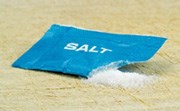
Top stories




He has called for regulations to limit salt in bread, breakfast cereals, processed meats, butter, salty snacks, soups and stocks, to name a few. This resulted in the publication of draft regulations, which specify the maximum levels of salt allowed in specific food categories.
The Consumer Goods Council of South Africa (CGCSA) has raised various concerns. Three of these are:
a. Proposed targets and timelines for reduction of salt levels in the identified foods
b. Consumer education in relation to the reduction of excessive salt consumption (discretionary salt intake)
c. Financial implications and impact on food prices
The proposed regulations include a two-phased reduction in salt content, with the first being in 2016 and a second lower level indicated for 2018. These timelines are unrealistic when compared to global salt reduction initiatives. It took countries such as the UK and Finland, respectively, five to 20 years to implement similar strategies.
Local industry in turn requested that some of these proposed timelines be extended to 2024. The latter proposal may ensure effective implementation of these regulations, once operative.
Some reasons for industry requesting that the proposed timelines be extended include, but are not limited to:
a. Consumer testing of new foods
b. Factory capability trials
c. Shelf life trials and stability tests
d. New packaging and artwork development
e. Finding suitable sodium replacers and impact thereof on the rest of the ingredients within a product
f. Time for consumer palates to adjust to lower sodium levels
Interestingly salt added in cooking and at the table represents a significant contribution to the salt intakes of South Africans. Discretionary sodium intakes vary between 33% and 46% of salt consumption, exceeding processed food salt levels. On this basis, much global intervention has been based on education and behavioural change and this would seem to be more effective than regulations alone. Regulations have not been shown to be effective anywhere else in the world and it is for this reason that the Council suggests that South Africa follow a voluntary approach versus regulations.
Thus, as honourable and well-intentioned as the Minister's objective may be, there needs to be concurrent, if not preceding, consumer education, which will, over time, lead to consumer behavioural changes.
It is notable that salt is used in food manufacture for many technical reasons beyond taste - think of the curing of meat and for food stability. The proposed regulations thus have significant implications for food production and food safety. In addition, reformulation and re-analysis of products and packaging changes will add costs to the supply chain during implementation of these regulations. The latter may thus also result in barriers to trade in some instances.
CGCSA and its members support the Department of Health's mandate to protect, improve and maintain public health. However, a formal request was made to the Department of Health that the process is done in a collaborative, transparent manner, with a realistic approach and timelines.
It is suggested that South Africa should:
a. Follow global best practice including voluntary vs. mandatory sodium targets
b. Implement realistic targets that are achievable within realistic time frames
c. Create a multi-faceted public salt reduction consumer education campaign that includes addressing sodium intakes across the entire food supply, as based on a strong research component. The latter should also include monitoring and evaluation of the campaign as to track the progress thereof.
Salt (sodium chloride) is commonly found in various processed foods. It has been used for centuries to improve the taste of food and for food preservation.
International health organisations, such as the World Health Organisation (WHO) along with many governments around the world, have called for reduction in the consumption of dietary salt. It is well documented that cardiovascular or heart diseases are one of the leading causes of death worldwide. Elevated blood pressure levels increase the risk of heart disease, and although high blood pressure can be attributed to many factors, one of the leading contributors is excessive intake of dietary salt.
For more, contact Ronel Burger, head of the Food Safety Initiative at the Consumer Goods Council of South Africa on +27 (0) 82 818 3602.